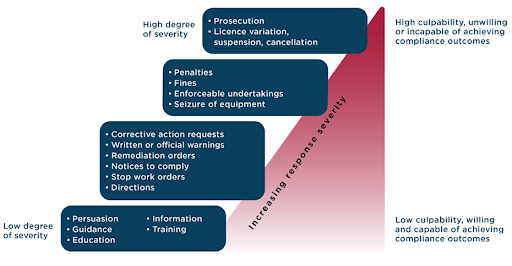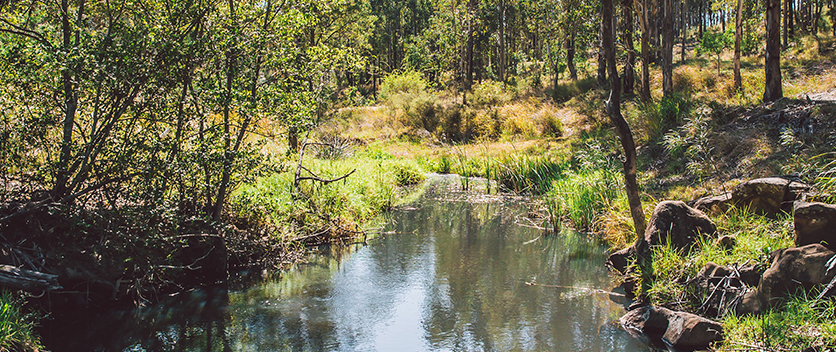The department is responsible for ensuring compliance with The Crown Land Management Act 2016 (CLM Act) and The Roads Act 1993 so that Crown land and Crown public roads are appropriately used and occupied.
We have an active and risk-based compliance and enforcement regime to help protect Crown land against illegal activity that threatens environmental values or the enjoyment of Crown land by the public.
This includes activities like unauthorised development on Crown land and waterways, dumping, clearing of vegetation, storage of personal materials and antisocial activities that would impact the public’s use and enjoyment of the land or waterway.
The department encourages tenure holders and the community to voluntarily comply with the provisions of these Acts and other relevant legislation in relation to the use of Crown land. Where non-compliance is detected, however, the department will use relevant powers and take appropriate action to ensure the use of Crown land is in accordance with the objects and principles of the Act.
Compliance activity is based on 4 key principles:
- education and awareness
- monitoring
- auditing
- compliance investigations
We monitor the use of Crown land and waterways through inspections, audits and aerial photography, undertaking enforcement action when required. We also encourage the public to report suspected unlawful or suspicious activity occurring on Crown land to the department.
We are guided by our compliance and enforcement policy (PDF, 282 KB) and you can find more information in the fact sheet (PDF, 417 KB).
Find more information about approved uses of the Crown estate including guidelines, fact sheets and FAQs.
We use contemporary enforcement and protection powers
We enforce:
- penalties that are consistent with environmental legislation. To deter compliance issues on Crown land, corporations receive higher penalties than individuals
- the issuing of rectification and remediation notices to ensure the restoration of damaged or contaminated Crown land to its former condition
- the issuing of orders to ensure people remove materials or structures illegally placed on Crown land
- stop-activity orders on the spot to stop or prevent unlawful, unsafe, or dangerous activities taking place on Crown land
- an extended 2 year timeframe to report and investigate breaches, enabling the greater ability to prosecute offences.

Help stop illegal activities on Crown land
While most people follow NSW laws, some carry out illegal activities on Crown land, including Crown roads and commons. Sometimes people break the law deliberately. At other times, people do the wrong thing because they don’t know what you can and cannot do on Crown land and waterways.
Illegal activity on Crown land can:
- threaten public safety and use of Crown land
- harm the environment
- waste public money.
These are potentially serious crimes.
Examples
- Dumping of rubbish, or toxic and harmful substances
- Abandoned vehicles
- Clearing of plants and trees
- Removal of timber and soils
- Public safety hazards
- Suspected unauthorised use or works on Crown land.
We will treat any information you give us confidentially.
Reporting an incident
Report suspicious or illegal activity on Crown land as soon as you can. Be careful of your safety.
Information to include:
- What is the issue or activity?
What do you think happened?
- What was the date and time that it happened?
- Where did it happen?
Give the address or lot number. If you can, give us:
- the deposited plan (DP) number
- GPS coordinates (exact location)
- a description of the site.
- how it affected:
- the environment
- public use and enjoyment
- your health and safety?
- name of the person/s who did the activity. If you don’t know their name/s, describe them.
Other helpful information you can give us includes:
- descriptions, registration numbers and type of any vehicles or equipment involved
- any photos or short video clips
- any other information you think could be relevant.
What we expect
We expect that people who report suspicious activity will help us respond appropriately:
- Make sure the report is genuine and not a private matter between people, such as an argument between neighbours.
- Give a clear description of the activity.
- Give all available and relevant information to Crown Lands, including any new activity that happens after the report.
- Do not deliberately give false information.
- Cooperate with Crown Lands’ inquiries.
- Answer our questions and requests for information as soon as you can.
- Treat Crown Lands’ staff with courtesy and respect.
If a person does not meet these expectations, Crown Lands may need to set limits or conditions on how we continue to respond or investigate.
If people behave unreasonably, or make complaints for no reason, we will follow the NSW Ombudsman’s manual for managing unreasonable behaviour.
Confidential reports
To make a confidential report of any suspicious activities to Crown lands:
- Email: [email protected]
- Phone: 1300 886 235 during business hours
Anonymous reports
If you do not want to give your name and contact details, we will not be able to:
- confirm we received your report
- ask for more information if we need it
- tell you the outcome of our assessment
- inform you of any action we have taken because of your report.
Because we cannot contact anonymous reporters if we need more information, we may not be able to act on your report.
How long we take to review reports
Your report will go to our compliance unit for assessment. We will review your report within 10 working days.
Our approach to reports of people allegedly breaking laws for Crown land depends on the degree of risk involved.
We record all reports we receive in a centralised database.
Initial assessment
We assess every report to determine its priority.
In some cases, we decide that no-one has broken laws for Crown land.
In others, the alleged breach has a low priority for the department. If so, we will consider the report in future monitoring and auditing campaigns instead of investigating it immediately.
How we decide which cases to investigate
Crown Lands allocates its resources to the cases with the highest priority. This includes those where the alleged activity is:
- significantly affecting public use or safety on Crown land, or
- causing serious environmental impact.
In deciding which reports to investigate in detail, we also consider:
The seriousness of the offence
- how responsible the alleged offender is
- if it is in the public interest to investigate
- if the report raises matters of special significance to Crown Lands’ existing compliance priorities
If Crown lands is the relevant agency
- if the report relates to someone breaking Crown land laws
- if the alleged activity is within our area of responsibility, or if another regulator should investigate
Widespread or ongoing problems
- if there is a pattern of unlawful activity
- if there is evidence of a widespread problem
- if the person or organisation has been the subject of previous reports, and the nature of these reports
Best use of resources
- if an investigation or other action would use too many resources, and/or is not in the public interest
- if the report relates mostly to a matter determined before by Crown Lands, but there is no new or compelling information that would make the department change its decision
- if the report is supported with evidence
- if the allegations relate to a lawful activity
- For example, permission may not be required for the activity, or it is allowed with a licence or approval and the user is complying with all the conditions
- if the events in the report took place a long time ago, so we will not be able to investigate any allegations effectively
- if the report does not appear to be true.
Crown Lands handles all information in line with the Government Information (Public Access) Act 2009 and Privacy and Personal Information Protection Act 1998.
If you have included your postal or email address in your report, we will acknowledge it by letter or email. A Crown Lands officer doing the risk assessment may contact you if they need more information.
If Crown Lands investigates, the officer may also contact you. If you agree, the officer may take your witness statement.
When we investigate reports that someone may have broken laws relating to Crown land, we will:
- confirm that it is likely someone has broken laws for Crown land
- assess the harm or impact of the alleged breach or activity
- determine any regulatory action(s) we must take to lessen the possibility of the activity happening again
- determine any regulatory action(s) we must take to lessen any actual or potential harm or effect caused by the alleged activity
- gather enough evidence to support the appropriate regulatory response
- decide on the appropriate regulatory response.
For detailed information about Crown Lands’ approach to reports of alleged breaches and illegal activity, read our Guideline – Crown land compliance and enforcement (PDF, 378 KB).
Crown Lands will also consider the severity of reports when we respond to alleged breaches. Crown Lands will respond more urgently to reports of alleged breaches that are causing serious, ongoing harm to public safety or the environment on Crown land.
Our response
Crown Lands’ regulatory priorities determine how it responds to reports of an alleged breach or unlawful activity. This means that Crown Lands will resolve reports alleging unlawful activity to our satisfaction, not necessarily the satisfaction of the person making the report. In cases where Crown Lands does not find enough evidence of unlawful activity, our ability to respond with regulatory action may be limited. Crown Lands may review the report if new information becomes available.
When we investigate a report, authorised officers usually must make one or more site inspections and collect information from relevant parties.
Crown Lands receives reports of alleged unlawful activity across the state. We must deploy our resources efficiently and where there is the greatest need. Because of this, Crown Lands will schedule site inspections for alleged unlawful activities that are not high-risk or time-critical when there is a group of alleged activities nearby. This will influence the time it takes for Crown Lands to complete these investigations.
We sometimes receive reports from neighbours where the people disagree but no-one is breaking Crown land laws. Examples include disputes over:
- the use of Crown roads where public access has not been restricted
- boundary fences not involving Crown land.
When a dispute between neighbours does not involve breaking laws for Crown land, it is likely to be a civil or private matter. Crown Lands does not get involved in civil matters.
Legal Aid NSW and Community Justice Centres may be able to help resolve these disagreements.
Some types of alleged illegal activities must be investigated by other government agencies, not Crown Lands. In these cases, we will refer the matter to the right regulatory authority.
All government agencies have responsibilities under various laws that in most cases relate to all land and waterways, including Crown land.
To report suspicious or unlawful activity confidentially to the Crown Lands team:
- email [email protected]
- phone 1300 886 235 during business hours
